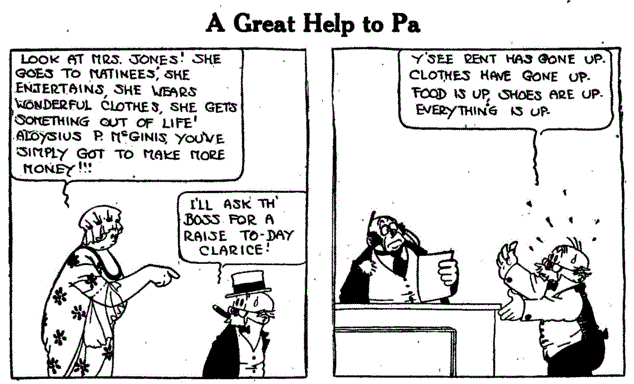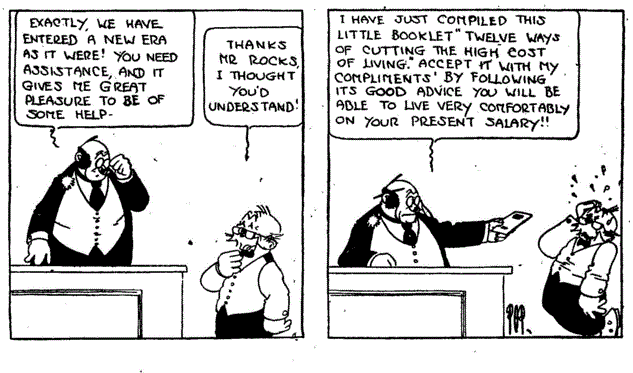

from Keeping Up With The Joneses (Cupples & Leon Company – New York, 1920)
by ‘Pop’ Momand
MEANING
If you say that someone is keeping up with the Joneses, you mean that they are doing something in order to show that they have as much money as other people, rather than because they really want to do it.
ORIGIN
Jones, one of the commonest British family names, has been used especially in the plural to designate one’s neighbours or social equals. For example, in Memoirs of a Station Master (1879), Ernest J. Simmons (1839-95) wrote:
There is a considerable amount of importance attached to this public place of meeting—the railway station. The Jones’s who don’t associate with the Robinsons, meet there. Mr Jones would not like the station master to touch his cap to the Robinsons, and pass him without notice.
The phrase was coined by the American cartoonist ‘Pop’ Momand (Arthur R. Momand – 1886-1987), who created in 1913 a comic strip titled Keeping Up With The Joneses. The Joneses themselves only appear in the strip as occasional references for the main characters, the McGinises, a household composed of Aloysius, his wife Clarice, their daughter Julie and the housekeeper Belladonna. In her review (published in Technology and Culture – October 2005) of Susan J. Matt’s Keeping Up with the Joneses: Envy in American Consumer Society, 1890-1930 (2002), Meg Jacobs, associate professor of American history at MIT, wrote:
Momand got the idea when he moved, as a newlywed, to Cedarhurst, New York, a fancy suburb on Long Island. Though the Momands lived well, they found themselves in a constant race to live up to the standards of their even-better-off neighbors. They soon quit the suburban lifestyle and moved back to Manhattan, where Momand began his comic strip. […] Mrs. McGinis towers over her husband, and her fixation on fashion and high society dominates their domestic life. In a typical cartoon, she remarks, “Wait’ll the Joneses hear we were at this swell dinner! Think of it, the Swedish Ambassador is here tonight.”
The title chosen by ‘Pop’ Momand became an idiomatic expression as early as 1913; in the Akron Beacon Journal (Akron, Ohio) of 18th September of that year, Marian Mason’s column As a Woman Thinketh was titled Don’t Try to Keep Up with Rich Neighbors and thus concluded:
There is more tragedy that nonsense in the common attempts at “keeping up with the Joneses” and the end comes too often in nervous breakdowns, separated families and life under the depressing burden of unpaid bills.
In The Cleanup Idea, published in The Denison Review (Denison, Iowa) of 27th May 1914, it is difficult to ascertain whether it is the idiomatic expression that is used or whether in order to keep up with the Joneses is due to an arbitrary choice of the common family names Jones and Brown:
The Iowa state board of health by proclamation has declared the week of May 4th cleanup and paint up week in Iowa […].
Cleanliness is contagious. The man who might let his place go to rack and ruin if he were on a desert island will hump himself to prevent his neighbor from outdoing him in improving the premises. In few lines of activity is a good example such a powerful factor. If Mrs. Jones has an attractive flower garden, Mrs. Brown is more than likely to suggest to Mr. Brown that they ought to get a hanging basket or two in order to keep up with the Joneses.
In Your Money’s Worth: A study in the waste of the consumer’s dollar (New York, 1927), the American economist Stuart Chase (1888-1985) and the American consumer rights activist Frederick J. Schlink (1891-1995) wrote:
Certain things we buy in order that we may live and be comfortable; other things we buy to keep up with the Joneses, or happily, to surpass the Joneses. The bulk of our food, much of our clothing, the roof over our heads, health and sanitation services, public education, we must have to continue functioning as individuals and as communities. Period furniture, frocks by Poiret, Tecla* pearls, Dobbs neckties, Rolls-Royces, permanent waves, twelve master’s bedrooms and a built-in swimming pool, give, it is alleged, a glorious feeling, but few maintain that life depends upon them.
(* Tecla: the proprietary name of a make of artificial pearl)
